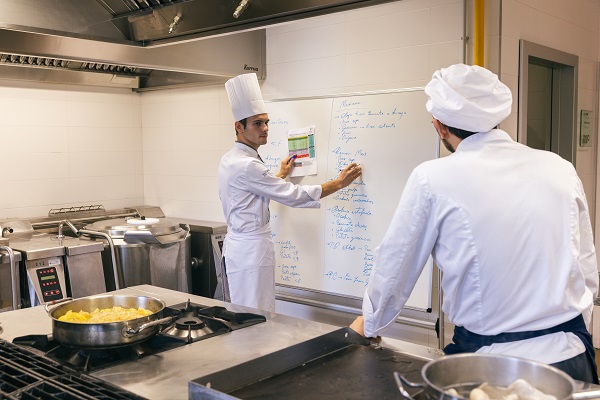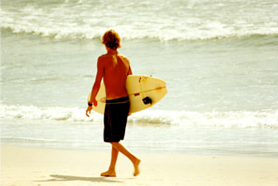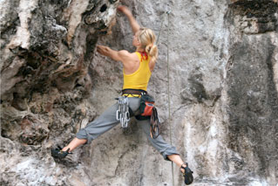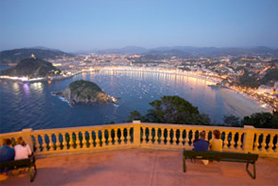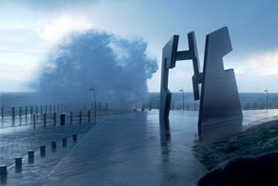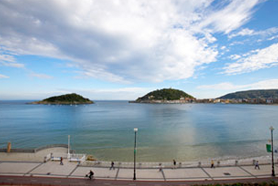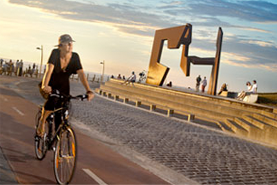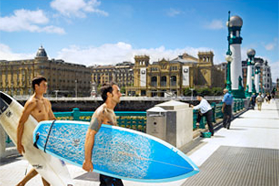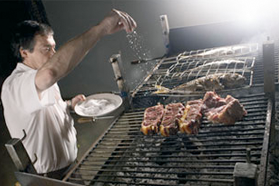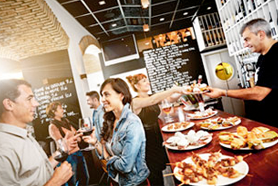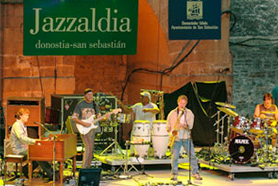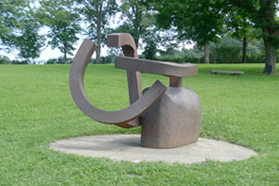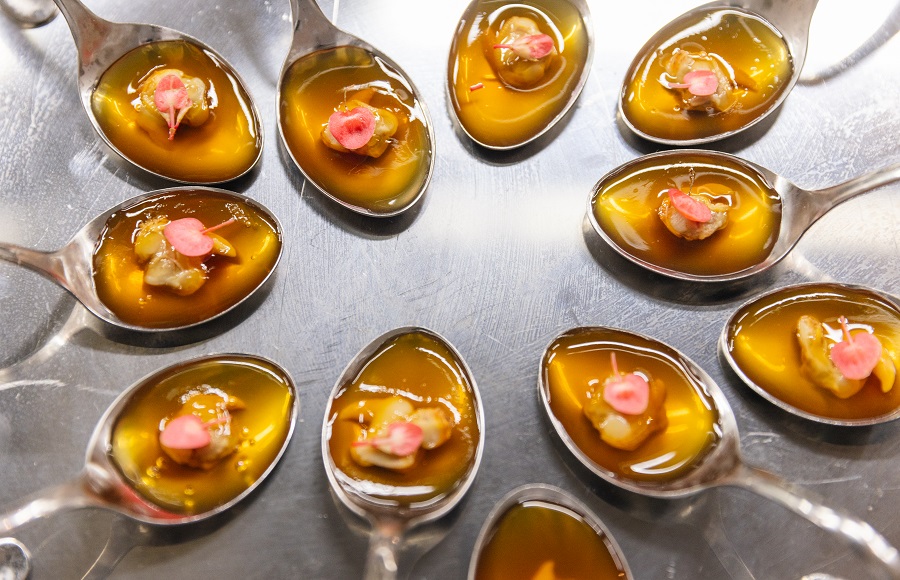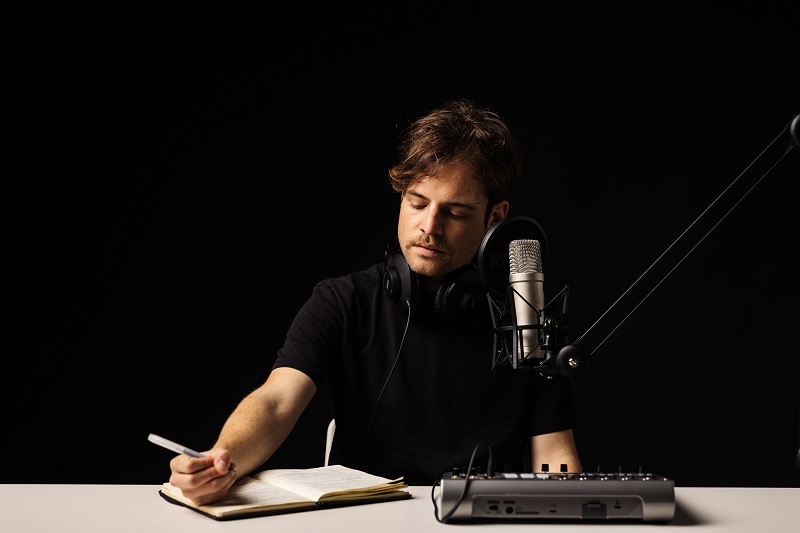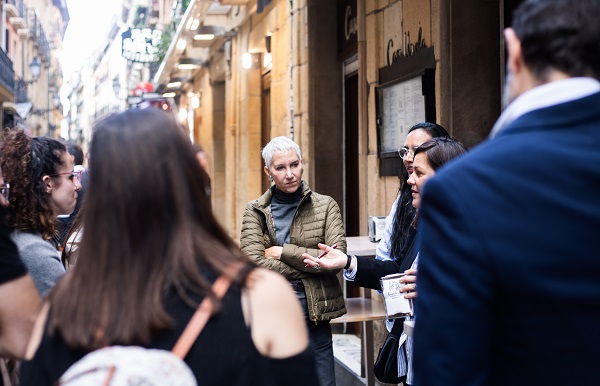Gain the skills for teaching in the Culinary Field.
Education is fundamental for transmitting knowledge. It's important to view it as a constant process rather than a static concept. What's the formula? Treating it as ever-evolving, receiving stimuli from various areas, people, and moments. Those who achieve this become what we know as educators.
This program is designed for culinary professionals who wish to share their knowledge and experiences with the future generations of chefs and other industry players. Throughout this journey, students will acquire the pedagogical and didactic skills necessary to teach effectively in culinary settings, whether it's in educational institutions, culinary schools, or professional training programs.
Practical information
Start Date: september 2024
Number of Credits: 60 ECTS
100% Online Format
Duration: 9 months in total
30 Spots Available
Offered by the Faculty of Humanities and Education Sciences in collaboration with Basque Culinary Center
The curriculum includes an optional course that consists of an in-person stay at the Faculty of Gastronomic Sciences of Basque Culinary Center, Donostia-San Sebastián, in May/June 2023.
Advances to Doctoral-Level Studies
For inquiries and more information, contact cursos@bculinary.com
Master'S Objectives
Develop critical, creative, innovative, and interdisciplinary thinking in the field of gastronomic education.
Understand the context and the teaching-learning processes in gastronomy.
Enhance competencies in teaching and facilitating learning in gastronomy.
Design and implement innovative educational projects.
Briefing session
On March 30, we conducted an online information session with the Coordinators of this Master's program, Anaïs Iglesias and Arantza Mongelos. During this session, we explored the subjects and the learning methodology, career prospects from this program, and discussed the teaching dates, the admission process, and the enrollment deadlines for this university degree.
You can now watch the recording of the session and learn more about the master's program in detail. Just put the option of english subtitules and enjoy.
Career Opportunities
We understand that professional opportunities may vary depending on the geographic location and individual preferences of students. However, with this program, participants can take on roles and positions in the following areas:
Teaching and/or research in fields such as Food Studies, Hospitality, Gastronomy, Culinary Arts, Gastronomic Sciences, Nutrition, Agricultural Engineering, etc.
Technical departments within food production companies.
Research or technology centers in the food industry.
Educational consultancy.
10+1 Reasons
YOU will:
1
Comprehend the gastronomy sector and its educational context, along with emerging trends in education and gastronomy.
2
Design formal and informal learning spaces and contexts, including those mediated by technology, with a strong focus on equity, emotional education, and values.
3
Learn from esteemed professionals in the educational sector and specialized educators in gastronomy.
4
Receive the tools to become a knowledge based educator in the field of gastronomy.
5
Be able to plan and execute research projects on teaching and learning processes in gastronomy.
6
Tackle real educational challenges in gastronomy, exploring new methodologies and the use of emerging technologies.
7
Collaborate with intercultural and multidisciplinary groups, bringing different perspectives to develop creative, innovative, and contemporary projects.
8
Receive an official degree that offers the opportunity to pursue a doctoral program later.
9
Stand out as a highly qualified professional for teaching in various degrees related to gastronomy and food.
10
Be eligible for diverse career opportunities in education, gastronomy, and culinary research, making a significant impact in these fields.
Directed to
The Master's program is aimed at individuals with the following profiles:
Current educators in culinary schools or Vocational Training centers who have entered the teaching profession through a Secondary Education Master's program and want to specialize in the field of gastronomy.
University educators or individuals responsible for training in restaurant and culinary centers who wish to develop personally and professionally as educators in the field of gastronomy.
University graduates seeking employment as culinary educators in culinary schools or the university environment, as well as non-teaching professionals interested in the field of education.
Academic Requirements:
Graduates in Gastronomy, Food Science and Technology, Tourism, Chemistry, Biology, Nutrition, Business Administration, Marketing, Communication, Economics, Pedagogy.
Language Requirements:
The Master's program is conducted in Spanish, so students whose native language is not Spanish must demonstrate a level equal to or higher than DELE B2. Additionally, a level of English equal to or higher than B2 is recommended for understanding papers, etc.
Programme
The general objective of the program is to provide the necessary skills to train innovative educators in the field of gastronomy, so they can facilitate various teaching and learning processes in the educational settings specific to the gastronomy field.
The curriculum for the Master's program is composed of mandatory and elective subjects. Out of the 5 available elective subjects, 4 must be chosen.
MANDATORY SUBJECTS:
- Educational Context, Trends, and Challenges (6 ECTS)
- Challenges and educational responses in changing cultural environments.
- Education and socialization processes.
- Historical evolution of education and the teaching profession.
- Challenges in teaching in gastronomy.
- Design of Educational Projects (6 ECTS)
- Conceptualization of educational innovation.
- Phases and elements of an educational innovation project.
- Methodology for constructing innovation projects.
- Strategies for generating innovative solutions.
- Learning Process and the Role of the Educator (6 ECTS)
- The role of the educator as a facilitator.
- From teaching to learning.
- From individual learning to collective learning.
- From theory to practice.
- Innovation in Teaching and Learning Processes (6 ECTS)
- Methodologies directed at active student learning: problem-based learning, case studies, projects, learning based on object analysis, etc.
- From grading to formative assessment.
- Tools for assessment.
- Experiences of educational innovation in the gastronomy field in different cultures.
- Design of Learning Experiences (6 ECTS)
- Evolution of lifelong learning models and new trends in Lifelong Learning.
- Physical spaces that promote learning, space as a tool for innovation and facilitating learning.
- Educational model and training in gastronomy.
ELECTIVE SUBJECTS:
- Tools, Methodologies, and Techniques for Learning in Restaurant, Mixology, and Sommelier (5 ECTS)
- Understanding restaurant, mixology, and sommelier knowledge in the sector and their specific characteristics.
- Management of training spaces and basic learning processes in restaurant, mixology, and sommelier.
- Addressing challenges, problems, and projects in the fields of restaurant, mixology, and sommelier.
- Tools, Methodologies, and Techniques for Learning in Cooking (5 ECTS)
- Addressing challenges, problems, and projects in the culinary field.
- Participatory pedagogical models applied in cooking.
- Transdisciplinary pedagogical models.
- Teaching and Learning in Digital Ecosystems (5 ECTS)
- Innovation in didactic resources: trends in information and communication technologies in teaching and learning processes.
- Tools, Methodology, and Research Techniques in Gastronomy (5 ECTS)
- Research context in gastronomy.
- Teaching proposals for the research field.
- Meaningful educational activities for teaching and learning in the research field.
- Strategies for guidance and supervision of research projects in gastronomy.
- Learning Experience at Basque Culinary Center (5 ECTS)
- Structuring and educational planning at Basque Culinary Center.
- Contexts and spaces for learning about gastronomy at Basque Culinary Center.
- The educator in the context of education in gastronomy.
- This subject will be taught in person at Basque Culinary Center for 3 weeks.
- Master's Thesis (10 ECTS)
- Research projects: principles, characteristics, phases, and design.
- Tools to manage the research project.
- Textual genres: designing a project, writing a report, and defending it.
- Whenever possible, Master's Theses tailored to students' interests will be proposed to align with their areas of affinity and expectations.
Calendar
Total duration: 9 months
Number of credits: 60 ECTS credits
Academic Period: september 2024 - may 2025
On- Site Optional Experience at Basque Culinary Center: may 2025 (3 weeks)
Weekly Dedication: 18 hours
Development and Defense of Master's Thesis: may - october 2025
Subjects:
Subject 1: Educational Context, Trends, and Challenges
Subject 2: Design of Educational Projects
Subject 3: Learning Process and the Role of the Educator
Subject 4: Innovation in Teaching and Learning Processes
Subject 5: Design of Learning Experiences
Electives:
Elective A: Tools, Methodologies, and Techniques for Learning in Service, Cocktails, and Sommelier
Elective B: Tools, Methodologies, and Techniques for Learning in Cooking
Elective C: Teaching-Learning Processes in Digital Ecosystems
Elective D: Tools, Methodologies, and Research Techniques in Gastronomy
Elective E: Learning Experience at Basque Culinary Center
Methodology
The Master's program is taught using the "learning by doing" methodology, which is based on the idea that the best way to learn is through practical experience and direct action. Instead of focusing solely on theory and passive instruction, this methodology promotes students acquiring knowledge and skills through active participation in practical activities and real projects.
The distance learning methodology is based on the use of the Mondragon Unibertsitatea Virtual Campus and attendance at synchronous classes for each subject. All activities are supported by individual and/or group tutorials, as well as a process of assessment before, during, and after. Before starting the various modules, a Welcome Plan is carried out, including online sessions to familiarize students with the objectives, methodology, and the virtual learning environment.
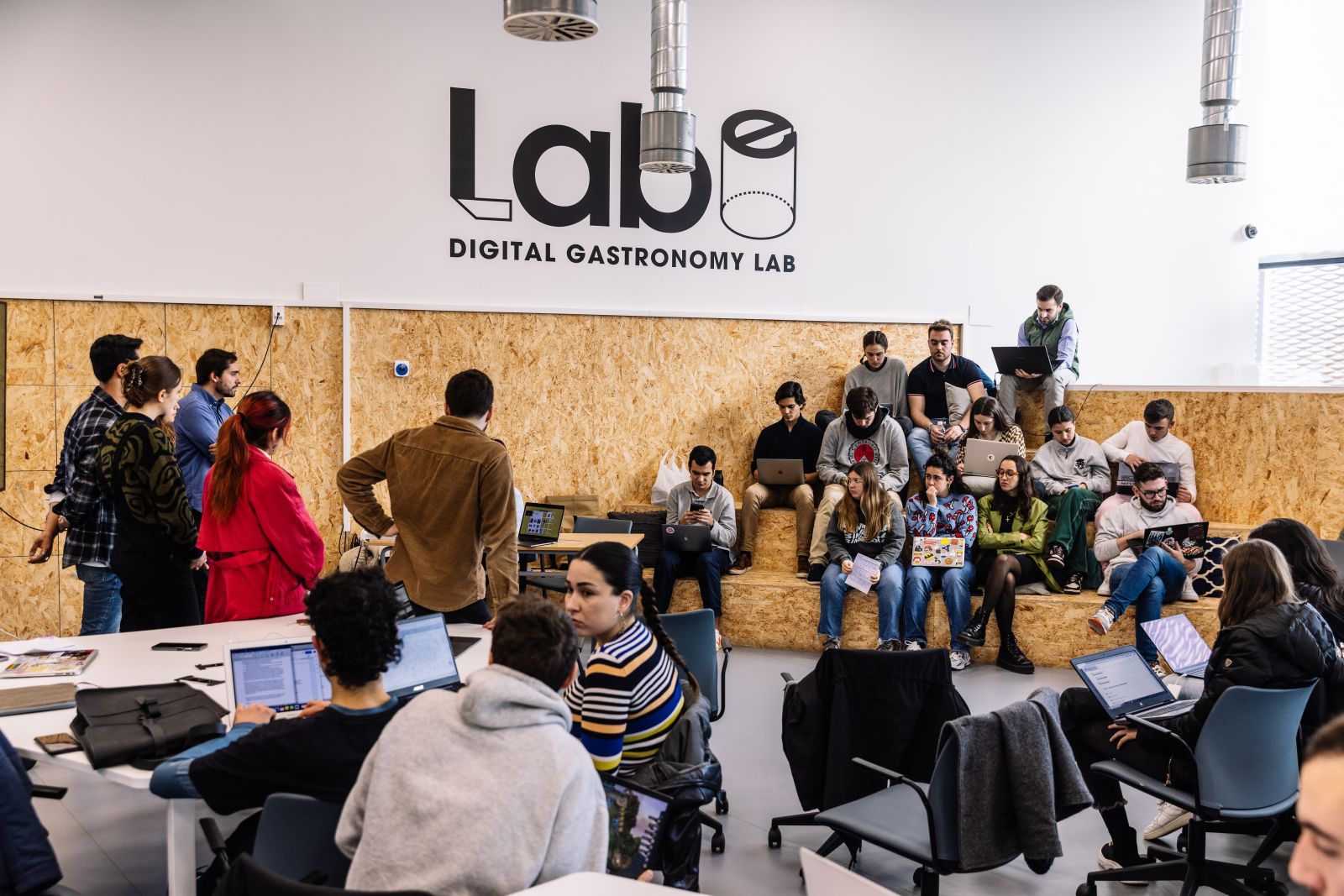
Some of the characteristics of the learning process in this program include:
- Problem-Based Learning: students synthesize and construct knowledge to solve problems in response to conditions they have set themselves. They assume different roles that rotate throughout the duration of the subject, and the teacher facilitates their progress.
- Practical Case Resolution: by solving cases, students apply the knowledge received and their own experience to respond to specific dilemmas. This method allows students to develop problem-solving and practical skills, fostering an open-minded approach to diverse solutions and innovation.
- Projects: students apply the knowledge received, learn about themselves in a critical way, and discover or enhance the need to collaborate with others. The learning process is structured in relation to a real problem observed in a formative context or proposed by the teacher. In small groups, students analyze the problem and carry out a project that provides a solution to that problem.
- Challenges: challenge-based Learning is a pedagogical approach that requires a global view of the real world. Learning intersects with the actions of the student. It harnesses students' interest in giving practical meaning to education while developing cross-cutting skills such as collaborative and interdisciplinary work, decision-making, communication, problem-solving, ethics, and leadership.
Teachers and guests
Learn from Industry Experts with Experience!
Students will have the opportunity to learn from accomplished professionals in the field, recognized for their academic, intellectual, and social influence, as well as their impactful contributions. The program features a panel of instructors composed of seasoned culinary experts with specialized knowledge in the field of Gastronomy.
Master's coordinator

Arantza Mongelos
Master's coordinator
Arantza's journey through the world of education began with a Bachelor's Degree in English Philology from EHU-UPV. Her passion for learning and teaching led her to further her studies with a Master's Degree in Applied Linguistics at the University of Edinburgh, expanding her horizons and expertise in the field. As she continued to delve into the intricacies of education, Arantza's dedication to her craft shone through. This dedication culminated in her earning a Ph.D. in Psychopedagogy from the University of the Basque Country (UPV-EHU). With her doctorate in hand, she embarked on a path of teaching and research at Mondragon Unibertsitatea. Over the years, Arantza's commitment to education has taken various forms, from coordinating Bachelor's and Master's degree projects to contributing to transfer projects in different educational centers. Her role as the Coordinator of the Bachelor's degree program in the Faculty of Humanities and Education Sciences at Mondragon Unibertsitatea exemplified her dedication to shaping the future of education. In addition to her contributions within her university, Arantza has also been a university coordinator for international projects at MEi (Mondragon Educación Internacional), showcasing her global perspective in the ever-evolving field of education.
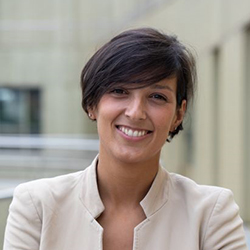
Anaïs Iglesias
Coordinators of the master
With a Ph.D. in Economics and Business Management from the University of Deusto and an MBA from the University of Pennsylvania, Anaïs embarked on a remarkable journey in the world of academia and business. Her story began with two years of consulting, where she delved into the intricacies of public administration strategy and business development, navigating challenges in both Spain and the United States. In 2005, her path led her to the University of Deusto, where she dedicated 13 years to projects that revolved around entrepreneurship education, social value-based education, and extensive research across various departments. Anaïs's work spanned European, national, and regional projects, each focused on fostering social innovation and enhancing business competitiveness. Her contributions extended to multiple publications and scientific disseminations, showcasing her commitment to sharing knowledge. Teaching has also been a significant part of her journey, beginning in 2014 when she shared her expertise in various university classrooms. And, since September 2018, Anaïs has become an integral part of Basque Culinary Center, where she has played a vital role in entrepreneurship coordination, adding yet another chapter to her story of educational and professional excellence.
Professors
Profesor BCC
Licenciado en Ciencias Biológicas y doctor-investigador de la facultad de Humanidades y Ciencias de la Educación (HUHEZI) de Mondragon Unibertsitatea (MU). Su labor docente inicial la ha desarrollado fundamentalmente en el ámbito de la didáctica de las ciencias experimentales y en las diferentes etapas educativas (Infantil, Primaria, Secundaria, Bachillerato y Formación Profesional). Esta labor la ha complementado con el desarrollo y la publicación de materiales curriculares dirigidas a ese mismo ámbito, y en concreto, dirigidos a la etapa de Educación Primaria. Su labor investigadora la ha desarrollado en diferentes proyectos de innovación didáctico-pedagógica y en diferentes ámbitos geográficos, nacionales e internacionales. Ha participado en una amplia gama de programas de formación y de transferencia también a nivel nacional e internacional a lo largo de su trayectoria profesional. Actualmente su foco investigador y de la actividad docente se sitúa en el estudio de los contextos y los procesos de enseñanza-aprendizaje, analizando los modelos pedagógicos que subyacen a los mismos y el análisis de la interactividad que se da en ellos.
Profesora BCC
Doctora en innovación e intervención en Educación Inclusiva, su interés se centra en los cambios actuales y su impacto en educación y más concretamente en las claves de contextos que facilitan el aprendizaje. Entre sus intereses destacaría la investigación sobre la práctica como espacio formativo, la reflexión sobre la práctica como instrumento para el desarrollo personal y profesional, el rol del docente universitario y la respuesta a los procesos de aprendizaje desde el análisis de contextos facilitadores de aprendizaje en diferentes niveles educativos. Su desarrollo personal y profesional viene alimentado desde su participación activa en foros de atención a personas en vulnerabilidad y de política comunitaria.
Profesora de la Facultad huhezi
Sirats Santa Cruz Elorza es graduada en Educación Primaria por Mondragon Unibertsitatea, dispone del máster oficial Desarrollo y Gestión de Proyectos de Innovación Didáctico-metodológica en Instituciones Educativas por la misma universidad y es miembro del grupo de investigación consolidado IKERHEZI: Investigación en Innovación Educativa. Es doctoranda del progama de doctorado en Innovación e Intervención Educativas por Mondragon Unibertsitatea y en su tesis investiga sobre la evaluación.
Desde 2016 es profesora e investigadora en el ámbito de la educación de la Facultad de Humanidades y Ciencias de la Educación de Mondragon Unibertsitatea. Ha coordinado y participado en varios proyectos de transferencia dirigidos a profesores de diversas escuelas vascas sobre la evaluación y la educación basada en competencias. Ha participado en varios congresos científicos, tanto nacionales como internacionales, sobre esta temática.
Profesora BCC
Graduated in Food Science and Technology from the University of Granada and an Illustrator. A graduate of the Master's in Gastronomic Sciences at Basque Culinary Center, she received a scholarship to work in the Sensory Perception department of BCCInnovation and completed her master's thesis on interdisciplinary interactions in R&D teams in gastronomy. She is currently a member of the Technical Committee for the Master's in Gastronomic Sciences and a professor in the Bachelor's program in Gastronomy and Culinary Arts, as well as in several other master's programs offered at Basque Culinary Center.
Fees / Grants
The total cost of the Master's program is €9.500 which will be paid as follows:
€1,000 upon admission confirmation as a reservation fee.
The remaining amount will be paid in 3 installments: the first at the time of enrollment, and the two following installments bi-monthly from the date of enrollment.
The price includes:
Educational materials (e-learning platform, downloadable resources, videos, synchronous classes, etc.).
Monitoring of the learning process.
Tutoring for the Master's Thesis.
Admission
The Admissions Committee of the Faculty of Humanities and Education Sciences at Mondragon University will be responsible for evaluating applications and selecting admitted candidates.
-
Interested students must complete the online registration. It is necessary to upload a copy of your ID/NIE or passport to validate the registration.
-
In addition to completing the online registration, you must send the following scanned documentation to admisiones@bculinary.com:
ACADEMIC DOCUMENTATION:
- STUDENTS IN THEIR FINAL YEAR OF A DEGREE OR UNDERGRADUATE PROGRAM:
- Academic transcript showing all grades obtained to date.
- STUDENTS WITH PREVIOUS UNIVERSITY STUDIES COMPLETED IN SPAIN:
- Notarized copy of the degree certificate or certificate from the university confirming the completion of studies.
- STUDENTS WITH PREVIOUS UNIVERSITY STUDIES COMPLETED IN A MEMBER COUNTRY OF THE EUROPEAN UNION, NORWAY, ICELAND, LIECHTENSTEIN, AND SWITZERLAND:
- ECTS (European Credit Transfer System) Transcript, or if not available
- Certification from the original university confirming the student's eligibility for Master's studies.
- STUDENTS WITH PREVIOUS UNIVERSITY STUDIES COMPLETED OUTSIDE OF THE EUROPEAN UNION, NORWAY, ICELAND, LIECHTENSTEIN, AND SWITZERLAND:
- Certification from the original university confirming the student's eligibility for Master's studies. This certification must be apostilled or, in the case of countries that have not signed the Hague Convention No. 12 of October 5, 1961, legalized by consular or diplomatic means.
LANGUAGE PROFICIENCY CERTIFICATION:
Students whose native language is not Spanish must demonstrate their proficiency in Spanish at the DELE B2 level or higher. Having an English level of B2 is recommended for the comprehension of documentation, papers, etc.
OTHER DOCUMENTATION: In addition to the above documentation, all students must submit:
- An updated CV.
- A motivation letter for the educational program.
- Personal interview (online): A personal interview may be conducted to assess the candidate's suitability based on motivation and learning objectives.
-
A personal interview will be conducted to assess the suitability of the candidate based on their motivation and learning objectives.
-
Payment of Enrollment Reservation Admitted students will be required to pay a reservation fee of €1,000.
It is important to note that:
- The application deadline is open until all available spots are filled. The maximum number of admitted students will be 30.
- For international students, the enrollment certificate and all necessary documentation for visa processing will be provided after the reservation fee has been paid.
For any queries or further information, please contact admisiones@bculinary.com
Permanence
Newly enrolled students must pass at least 20% of the credits for which they are registered. After this phase, each student will have a maximum of four examination opportunities per subject.
Student service
Accommodation

LIVENSA LIVING SAN SEBASTIÁN, AN INNOVATIVE CONCEPT OF LODGING
Livensa Living San Sebastian is located in the neighborhood of Ibaeta, in a quiet area and a step away from Tolosa Avenue that leads to Ondarreta beach. It is an accommodation that takes care of all the details and is designed to make you feel at home during your stay in Donostia-San Sebastian. It has spaces to relax and share time in company.
Features to highlight:
- Single rooms with full kitchen and private bathroom
- Laundry
- Gym
- Common kitchens or "txokos".
- Leisure areas: living room, games room, cinema room, etc.
- Music rehearsal rooms
- Co-working spaces
- Private parking
Take advantage of the preferential rates for Basque Culinary Center students.
More information about accommodation here
Other accommodation options
Religious residences
These types of residence are small and have restricted entrance times. The rooms can be single or double and they do not always have an ensuite bathroom. Those that offer full board may not offer all the meals at weekends. Admission to these residences entails a personal interview with the families. The prices given below are approximate.
Female residences
Residencia Compañía de María
Camino de S. Bartolomé, 24. Tel 943 464795. Regimen full board Precio aproximado €625/month
Esclavas del Sagrado Corazón
Avda. Gral. Zumalakarregi, 11. Tel 943 210800. Regimen full board Precio aproximado €580-€615/month Residents must leave the residence at weekends with the exception of examination periods.
Misioneras del Sagrado Corazón
Paseo de la Fe, 34. Tel 943 456072. Regimen full board Precio aproximado €350-€490
Residencia Villa Alaidi E.A.M.
Paseo de Heriz, 95. Tel 943 210866. Regimen half board or full board Precio aproximado from €450 to €590/month No se ofrecen comidas durante el fin de semana aunque hay una cocina a disposición de las residentes.
Residencia el Carmelo Pasión
Ilumbe, 8. Tel 943 456600. Regimen full board Precio aproximado €540-€605/month
Colegio Mayor Jaizkibel
C/ Aldapeta, 49. Tel 616 369 815. Regimen Pensión completa. Precio aproximado 932€/mes. No hay cocinas disponibles para las residentes pero las estudiantes de BCC podrán realizar prácticas de cocina.
Residencia Cet Oria
Paseo de Ayete, 25. Tel 943 242400. Regimen pensión completa. Precio aproximado 370€. El precio del alojamiento y pensión se costea trabajando en el servicio de alimentación. Admisión mediante entrevista.
Camino de S. Bartolomé, 24. Tel 943 464795. Regimen full board Precio aproximado €625/month
Avda. Gral. Zumalakarregi, 11. Tel 943 210800. Regimen full board Precio aproximado €580-€615/month Residents must leave the residence at weekends with the exception of examination periods.
Paseo de la Fe, 34. Tel 943 456072. Regimen full board Precio aproximado €350-€490
Paseo de Heriz, 95. Tel 943 210866. Regimen half board or full board Precio aproximado from €450 to €590/month No se ofrecen comidas durante el fin de semana aunque hay una cocina a disposición de las residentes.
Ilumbe, 8. Tel 943 456600. Regimen full board Precio aproximado €540-€605/month
C/ Aldapeta, 49. Tel 616 369 815. Regimen Pensión completa. Precio aproximado 932€/mes. No hay cocinas disponibles para las residentes pero las estudiantes de BCC podrán realizar prácticas de cocina.
Paseo de Ayete, 25. Tel 943 242400. Regimen pensión completa. Precio aproximado 370€. El precio del alojamiento y pensión se costea trabajando en el servicio de alimentación. Admisión mediante entrevista.
Male residences
Pº Ayete, 25. Tel 943 21000. Regimen Pensión Completa. Precio aproximado 1.055€/mes.
Pº Maddalen Jauregiberri,2. Tel 943 454400. Regimen habitación y desayuno. Precio aproximado 320€-380€/mes.
Secular residences
These are mixed and are larger than the religious residences. As a general rule, they do not have entrance times.
Mixed residences
Numad Studios
Paseo de Miramón, 162. Tel (+34) 943 56 91 28. Regimen acommodation in studio with fully furnished kitchen and private bathroom Precio aproximado desde 600€ hasta 880€/mes A tan solo un paso de Basque Culinary Center. Instalaciones equipadas con un amplio espacio de cocina dedicado a prácticas culinarias, salas de estudio, gimnasio y zona lounge para socializar con otros residentes.
Colegio Mayor Olarain
Pº Ondarreta, 24. Tel 943 003300. Regimen alojamiento y desayuno, media pensión o pensión completa Precio aproximado desde 498€ hasta 1.090€/mes. El precio incluye la limpieza del uniforme de cocina. No hay cocinas disponibles para los residentes aunque los estudiantes de BCC podrán hacer prácticas de cocina en un espacio debidamente equipado para ello.
Residencia Manuel Agud Querol
Pº Berio, 9. Tel 943 563000. Regimen alojamiento. Precio aproximado desde 403€ hasta 690€/mes. Residencia de la Universidad de País Vasco; alojan prioritariamente a los estudiantes de la UPV pero pueden tener plazas disponibles desde la reciente ampliación.
Paseo de Miramón, 162. Tel (+34) 943 56 91 28. Regimen acommodation in studio with fully furnished kitchen and private bathroom Precio aproximado desde 600€ hasta 880€/mes A tan solo un paso de Basque Culinary Center. Instalaciones equipadas con un amplio espacio de cocina dedicado a prácticas culinarias, salas de estudio, gimnasio y zona lounge para socializar con otros residentes.
Pº Ondarreta, 24. Tel 943 003300. Regimen alojamiento y desayuno, media pensión o pensión completa Precio aproximado desde 498€ hasta 1.090€/mes. El precio incluye la limpieza del uniforme de cocina. No hay cocinas disponibles para los residentes aunque los estudiantes de BCC podrán hacer prácticas de cocina en un espacio debidamente equipado para ello.
Pº Berio, 9. Tel 943 563000. Regimen alojamiento. Precio aproximado desde 403€ hasta 690€/mes. Residencia de la Universidad de País Vasco; alojan prioritariamente a los estudiantes de la UPV pero pueden tener plazas disponibles desde la reciente ampliación.
Accommodation in shared flats
Prior authorisation from interested parties, the BCC Students'Office favours contact among admitted students so that they can organise themselves to share flats. Traditionally, students have created groups in social media to contact each other. The BCC also informs students about rented flat offers that the owners send us. The average price per student in a shared flat in Donostia-San Sebastian is around €300 per month.
Procedures before travelling
Students from European Union member countries, Norway, Switzerland. Liechtenstein and Iceland will not require a visa to reside in Spain.
Other international students will have to request a long-term student visa which will allow them to reside in Spain for a period longer than 180 days.
Visas should be requested from, and issued by the Diplomatic Missions and Spanish Consul Offices abroad. It is important to obtain information on the required documentation and gather it as soon as possible, since the relevant authorities may take up to two months to notify that visas will be granted.
Once students have arrived in Donostia-San Sebastian, they have one month from the time of their arrival to request the foreign students’ card at the Foreign Residents Office in Donostia-San Sebastian. The students’ office of the BCC will provide the necessary information to students in this matter.
Sport service
Through the MU Sports Service, students can access team sports as well as individual sporting activities and Group trips (weekend skiing, surfing trips….).
Donostia-San Sebastian also has an extensive offer of municipal sporting facilities. The Kirol Txartela (sport card) permits access to all the city’s municipal facilities at a very economical price. For more information, go to the following link.
Cost of living info
Information on the COST OF LIVING in San Sebastian is given below:
The best way to move around the city is with the network of urban buses. The company which provides this service is Compañia del Tranvia de Donostia-San Sebastian.
Their web page www.dbus.es contains all information on routes, timetables and tariffs. The web page also enables the calculation of the bus route between two points and its estimated duration.
Students can benefit from monthly season tickets which reduce the cost of travelling by bus.
Donostia - San Sebastián
Donostia-San Sebastian is the administrative capital of Gipuzkoa, one of the territories that integrates the Basque Country. There are two official languages: Spanish and Basque.
On the banks of the Bay of Biscay,, Donostia-San Sebastián is a small town within a natural framework of incomparable beauty. A holiday destination for monarchs and nobles during the Belle Epoque, Donostia-San Sebastian arose as a lordly city where tradition and modernity exist side by side.
If there is something that can compete with its spectacular beauty that is its gastronomy: cradle of the “new Basque cuisine”, Mecca of culinary avant-garde and the world capital of the pintxo, Donostia-San Sebastian is the city with the most Michelin stars per square metres in the world. The importance of its restaurants, its famous gastronomic societies and the quality of its raw material convert Donostia-San Sebastian into a gastronomic reference in the world. Not in vain, the British magazine, “Which”, chose Donostia-San Sebastian as the best gastronomic destination in the world.
Over the last few years, innovation and sustainability have been the two main pillars for the development of Donostia-San Sebastian, which has fostered an ideal city of pedestrians and bicycles.
Why study gastronomy in Donostia-San Sebastian?:
- ecause in Donostia-San Sebastian, as in the rest of the Basque Country, gastronomy forms part of society and good food is present at any event and celebration. Donostia-San Sebastian, a city of 185,000 inhabitants, has 120 gastronomic societies.
- Because four of the eight restaurants with three Michelin stars in Spain are in the Basque Country, three of them in Donostia-San Sebastian.
- Because of its cultural offer, which includes internationally renowned film and jazz festivals. Donostia-San Sebastian has been named as European Capital of Culture for 2016.
- Due to its beaches, ideal for practicing surf all year round.
- Due to its mountains, just 2.5 hours from the Pyrenees.
- Because it is a safe, accessible and welcoming city.
How to reach Donostia-San Sebastian
Donostia-San Sebastian is connected to the main Spanish cities by bus, train and plane. The airport of Donostia-San Sebastian is 20 kilometres from the city. It is a small airport with direct flights from Madrid and Barcelona. It has a bus service to the city centre. The international airport of Bilbao is one hour from Donostia-San Sebastian, and it is connected to the city with a frequent bus service from the actual airport. The international airport of Biarritz is 45 minutes away although it only offers a direct bus to Donostia-San Sebastian once a day. DISTANCE IN KMS.
- Bilbao – 99 km
- Biarritz – 50 km
- Madrid – 450 km
- Barcelona – 570 km

BCC Students
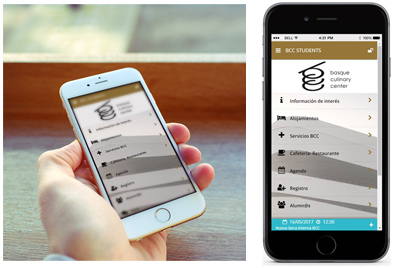
During their study years, BCC students will have access to the BCC Student APP. Through this APP students will be informed about grants and scholarships, job opportunities, extracurricular learning opportunities, events, invitations to exclusive Master Classes... They will also be informed on student discounts, BCC Cafeteria or Restaurant reservations, transportation, etc.
BCulinary Alumni
You can access all the information in the following link.

